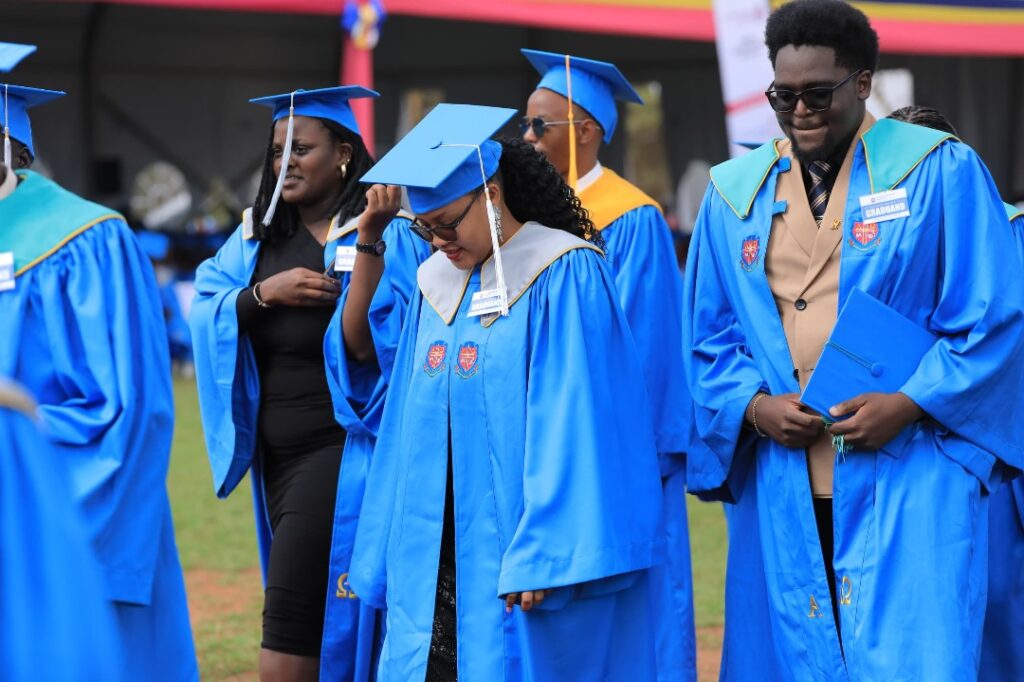By Asenath Were
Completing university is a pivotal milestone, marking the transition into adulthood and the professional world. However, for many students, this phase can feel intimidating, particularly when faced with the question, “What next?” Therefore, as students transition from campus life to adulthood, they should focus on personal growth and readiness for the challenges ahead, says Samuel David Lukaire, Sports Administrator at Uganda Christian University.
“This is the time to work on yourself both socially and spiritually. Develop the character traits that will shape you into a better individual,” Lukaire advises. He emphasises that graduation is not just about leaving school but stepping into a new phase of life, requiring self-reflection and improvement.
Practical skills and documentation
Lukaire urges students to gain essential life skills, such as driving. “Most of us come from families where we don’t receive sufficient training in practical skills like driving or riding a motorcycle. Learn these skills and obtain a permit to avoid missing out on opportunities that may require such competencies,” he notes.
Additionally, securing crucial documents such as a National ID, NIN, TIN, and NSSF number is vital. “Many young people delay starting jobs or receiving salaries because they lack these documents. Process them early to avoid unnecessary setbacks,” he advises. He also highlights the importance of opening a bank account and acquiring a passport, which can be invaluable for further studies or overseas opportunities.
“Having these documents doesn’t guarantee success, but it prepares you for opportunities and sets you apart from others,” Lukaire explains.
Volunteer and build work habits
Lukaire strongly encourages graduates to volunteer or intern while awaiting formal employment. “Don’t sit at home waiting for a job. Volunteer in areas that excite or challenge you,” he says. He adds that even working in a supermarket can help develop discipline, such as waking up early, adhering to schedules, and managing responsibilities.
“If you’ve been living a relaxed lifestyle, adjusting to workplace timelines becomes hard. Volunteering prepares you mentally and physically for the demands of employment,” he observes.
Acquire new skills and network
Lukaire stresses the importance of learning new skills in in practical fields to stand out in the competitive job market. “Skills like computer proficiency can open doors and broaden opportunities,” he says. He recalls how his own IT skills gave him an edge early in his career.
He also recommends engaging in community service or church ministries. “Volunteering in your community or at church not only builds character but can also lead to unexpected opportunities,” he says. Lukaire believes such initiatives teach graduates to work with people, understand workplace dynamics, and develop resilience.
According to Lukaire, organisations often retain volunteers who have demonstrated commitment. “When opportunities arise, they’ll likely consider someone who’s already familiar with the organisation over an external candidate,” he points out.
Lukaire advises graduates to prepare themselves by gaining essential skills, acquiring key documents, volunteering, and building habits that ensure a smooth transition into the professional world. “These steps lay the foundation for success in the job market,” he affirms.
Alexandah Babirye, a Makerere University student awaiting graduation, has found herself having to wait long before she can graduate. Despite having completed her studies, delays such as missing marks have left her with a year-long wait. Speaking from experience, Babirye says it is important to utilise this time constructively. “Since you can’t easily get a job in your field of expertise due to lack of academic papers, you can look for a skill,” she says. Babirye herself pursued a short course in Virtual Assistance (VA), which has enabled her to work online for clients from countries such as Australia, Germany, and the UK while residing in Uganda.
Babirye advises students to explore skills or engage in community service instead of staying idle. “At the end of the day, sitting at home doesn’t benefit you. But moving out and finding something that adds value to your resume might turn out to be crucial for your career,” she explains. For example, she suggests that those with a background in computer engineering could establish small businesses such as photocopying or stationery services. These ventures can offer financial stability and may even evolve into full-time enterprises.
For individuals with hobbies, Babirye encourages turning those passions into professions. “For instance, if you love swimming, you could become a swimming coach and teach children how to swim,” she suggests. Additionally, she highlights the availability of free online scholarships and courses to help one acquire new skills.
Peace Agunyu, a Bachelor of Social Work and Social Administration (BSWASA) student at Uganda Christian University, who is set to graduate in July, echoes Babirye’s sentiments. Agunyu is actively conducting research and applying for jobs but strongly recommends volunteering. “Even if you apply for jobs and don’t get responses, volunteering is a great way to gain experience and network,” she stresses.
Similarly, Zephaniah Kyobwika, a Social Work student at UCU, plans to utilise his six-month break before graduation in July by volunteering. “I will be working with the UCU Lady Cardinals and also plan to reach out to the administration of Sanyu Babies’ Home for a weekend volunteering opportunity while I wait for graduation,” he says.
The period before graduation is a unique window of opportunity. By engaging in productive activities such as skill-building, networking, and volunteering, you can position yourself for a successful transition into professional life.


